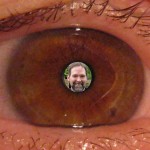On May 18, 2010 the Center for Inquiry, the Council for Secular Humanism and the Committee for Skeptical Inquiry jointly announced that they had accepted the resignation of Paul Kurtz from each of these boards. Kurtz, who had founded each of these three organizations, had been serving on each of the boards, and as well as serving as Chair Emeritus of CSH and as Editor in Chief of CSH's flagship publication, Free Inquiry. In the joint announcement, the boards recognized Dr. Kurtz for his "decades of service to the Council for Secular Humanism, the Center for Inquiry (CFI), and its other affiliates." This same announcement also contained the following statement:
At Paul Kurtz's behest, CFI and its affiliates began years ago to organize a leadership transition. Moreover, in recent years the board had concerns about Dr. Kurtz's day-to-day management of the organization.
As a long-time subscriber to
Free Inquiry and
Skeptical Inquirer, I was familiar with many of the writings of Paul Kurtz, but I had never before spoken with him or corresponded with him. As a result of reading his articles at Free Inquiry, I was also aware that there was internal tension at those organizations (e.g., see
here ,
here, and
here).
After reading about his resignation, I emailed a short note to Mr. Kurtz to wish him well in light of the announcement of his resignation. I also asked him whether he would allow me to interview him with regard to the announcement. He agreed:
[Note: CFI's CEO Ron Lindsay
responded to the following interview of Paul Kurtz here.]
EV: To what extent was your resignation from the Center for Inquiry voluntary?
PK: It was done voluntarily, but under great duress.
[caption id="attachment_14572" align="alignright" width="150" caption="Paul Kurtz (Permission by Wikimedia Commons)"]

[/caption]
--
EV: What were your titles and job duties prior to your resignation.
PK: I founded the modern skeptics movement and sustained it for over three and a half decades. I had been the Chairman of the Center for Inquiry, the Council for Secular Humanism and the Committee for Skeptical Inquiry. In June, 2008, I was made "Emeritus" and stripped of any authority. Since 1980, I was Editor-in-Chief for Free Inquiry, but starting in June 2008, I no longer had any authority. I never received any compensation working for these organizations. I worked as a volunteer, living off savings I accrued while working as a philosophy professor. In fact, my wife and I donated more than $2 million dollars over the years to CFI, CSH and CSI. We were the second largest donors to these organizations. Over the years, I helped to raise over $40 million for the Center for Inquiry.
--
EV: I saw the announcement of your resignation in the August/September, 2010 issue of
Free Inquiry. Why didn't you publish any explanation regarding your resignation in Free Inquiry?
PK: Tom Flynn and the CFI Board refused to run my letter of resignation in
Free Inquiry or any of the Websites of CFI. It was censorship, clear and simple. I was censored four times, beginning in June 2008.
[More . . . ]


